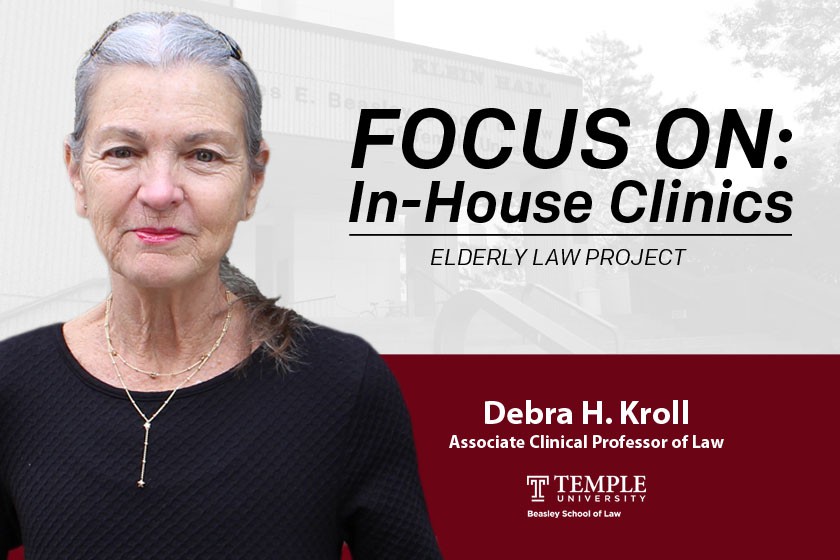Editor’s note: At Temple Law School, student advocates can hone skills, explore their professional identities, and work with community members in pursuit of solutions to real-world legal problems. We checked in with the professors who lead Temple’s in-house clinics to learn more about what they teach, and why. In this second post, we discuss the Elderly Law Project with Professor Debra Kroll.
TLS: What is the Elderly Law Project about?
Professor Kroll: The Elderly Law Project is a clinical course to be taken after the doctrinal course, Law and Aging, which is a prerequisite. Students handle real cases from the point of intake through to completion. The kinds of legal problems run the gamut of civil legal issues that affect people generally in our society. The only difference is that we help seniors, 60 and over, who represent some of the most vulnerable portions of our population. We focus upon public benefit issues, write Wills and Health Care Directives for free, but also help with consumer problems, landlord/tenant problems, and whatever legal problems we can assist with that come into our sight.
TLS: What experiential opportunities does the class include?
Professor Kroll: Students are in job placements on most Wednesdays during the Spring semester. These are either senior citizen centers or residential facilities. The student gives legal assistance throughout the day and really gets used to interviewing clients and problem-solving. We have case reviews or case rounds and everyone in the class has the benefit of hearing about and helping each other with their cases. Students also represent people at Social Security hearings before an Administrative Law Judge.
TLS: Who should take this course?
Professor Kroll: I think this course is good for anyone who plans to practice law. The skills learned are transferable to any practice setting. The seniors are a perfect demographic to sharpen interviewing skills and communication skills across the board. There are opportunities to represent people at social security hearings and to do many informal negotiations (for example with contractors or collection agencies). We also advocate and learn mediation skills. These skills are the basis for all legal practice in whatever area of law and this is a wonderful forum to learn them and try them out prior to graduation under the supervision of an experienced attorney.
TLS: Why do you teach this course?
Professor Kroll: I have been teaching it for 36 years because I have viewed this age group as a growing and ever present part of our society that often goes unrepresented and ignored. This has gotten worse as the population has been aging by leaps and bounds. It is the fastest growing portion of our population. The baby boomer population is going encounter a greater problem because of how many people are going to be old. I predicted this happening way back in 1981 when I began. My prediction has become a reality and Elder law is an important area of law that can no longer be ignored!
TLS: Can you describe a time when a student made a difference for a client?
Professor Kroll: This question would take hours and hours for me to answer since there is not a day that goes by that a student taking this course does not make a difference in a senior’s life. An example is the woman from Guatemala who had a double mastectomy and was denied disability. We represented her, after being homeless and having to live with a son and his children for almost two years, and we won her long awaited disability hearing and got her a large lump sum retroactive payment and a sizable amount of disability each month to cover her expenses.
Another is the man who attempted to kill himself after getting a notice that he owed $27,000 in an overpayment to social security. He had informed the Social Security of his earnings in a job and they told him he was within the correct limitations not to pay anything back. Years later they admitted they were incorrect and demanded the money, in a lump sum, or were going to stop his monthly check until the money was paid back. We appealed the case and won. He was not at fault for the mistake, Social Security was, and he could not afford to pay in back. Both essential prongs for not paying back an overpayment were met!
Patience, kindness, and quality legal assistance to every client are mandatory. ~ Professor Debra Kroll
TLS: What is the one lesson you hope every student takes away after participating in this clinical?
Professor Kroll: My hope is that you recognize that loving your work, your job, is such an important part of life. Finding the right niche or professional path enhances every part of your life. The gratification you receive from helping others is priceless!
TLS: What is the one most important lawyering skills learned in your clinic?
Professor Kroll: Patience, kindness, and quality legal assistance to every client are mandatory. The ethical foundation for attorneys is highlighted in everything that is done in the clinical and forms a basis for the way we treat our clients throughout our professional careers.

